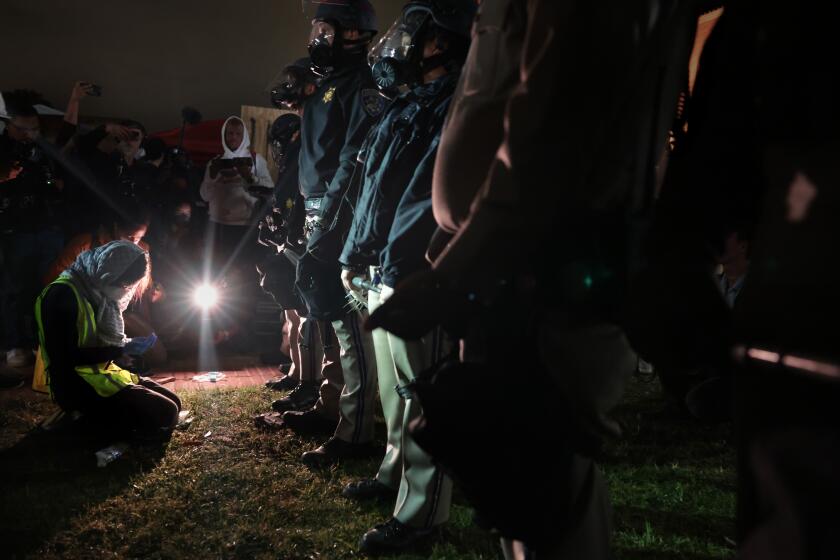Jobless College Graduates Hard Hit by New Fee : Education: Survey finds community colleges’ $50-per-unit cost for those with bachelor’s degrees affects the unemployed and part-time workers most. Many said they will be unable to continue their schooling.
A new $50-per-unit fee for community college students who hold bachelor degrees will hit hardest at those who are unemployed or working part time and are in need of job retraining, a survey of students at two-year colleges in the Sacramento area has found.
More than 40% of 1,500 students who responded to the survey questionnaire said they were out of work or were working part time, while one-third of respondents said their household income was below $25,000 a year.
The survey by the Los Rios Community College District, which enrolls 52,000 students on three campuses in and near the state capital, provides the most detailed information available on the effects of the fees, which were adopted at the end of the last legislative session to cope with the state budget deficit.
The survey also found:
* Almost 10% of students who hold bachelor’s or more advanced degrees have household incomes of less than $8,000, which is well below the federal poverty level.
* About half the respondents said they would be unable to continue their educations because of the sharp fee increase.
* Only 11% said they would qualify for one of the three exemptions to the higher fees--students who are classified as “dislocated workers,” “displaced homemakers” or who are on public assistance.
* Forty-seven percent of those who replied said they received their baccalaureate degrees from the California State University system, 17% from a University of California campus and 34% from either private or out-of-state institutions.
Los Rios Chancellor Marjorie Blaha said Gov. Pete Wilson and the Legislature “apparently thought these were relatively affluent people who were taking courses for personal enrichment, but I think they hit the wrong population or they overgeneralized.”
Blaha said conversations with her colleagues who run two-year colleges in the state indicated that at least half of their students with bachelor degrees plan to drop out when the new fees take effect in January.
“It is clear that we have many students who are unemployed or underemployed, often single heads of households, who now cannot afford to get the job retraining they need,” the chancellor added. “That does not bode well for the future economic health of this state.”
Legislation to increase community college fees for bachelor degree recipients was defeated in the Assembly and Senate in the last session but the idea surfaced again in late summer, when Wilson and legislative leaders were trying to close an $11-billion gap between expected revenues and anticipated spending in the 1992-93 budget.
“This is an example of what happens when fundamental policy decisions are made under the pressure of last-minute budget decisions,” said Chancellor David Mertes of the statewide community college system. Mertes said he is asking all colleges in the two-year system to conduct their own surveys on the impact of the fees.
“The governor and the Legislature made a terrible mistake,” said Patrick McCallum, executive director of the Faculty Assn. of California Community Colleges, which includes about 6,000 faculty members in the state’s 107 two-year colleges. “Jobs are changing and our institutions are supposed to be retraining people for new kinds of work. Instead, we’re raising fees so they can’t possibly continue.”
Warren Fox, director of the California Postsecondary Education Commission, which advises the governor and Legislature on higher education policy, said the fee increase is a bad idea but the alternatives are worse.
Fox said some community colleges are so overcrowded that the decision was made to charge higher fees for those “who have already had one bite of the apple”--that is, students whose UC or Cal State educations have been partially subsidized by taxpayers. He also said the exemptions for displaced workers and those on welfare would relieve part of the problem for the neediest students.
But McCallum contended that many students will never learn about the exemptions and, among those who do, the rules are “so stringent that relatively few will be eligible.”
More to Read
Start your day right
Sign up for Essential California for news, features and recommendations from the L.A. Times and beyond in your inbox six days a week.
You may occasionally receive promotional content from the Los Angeles Times.






